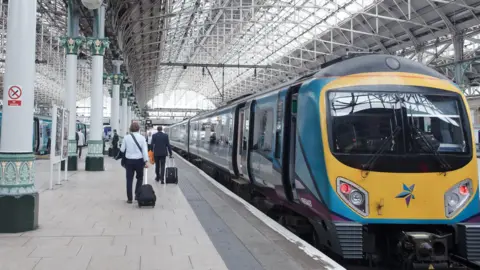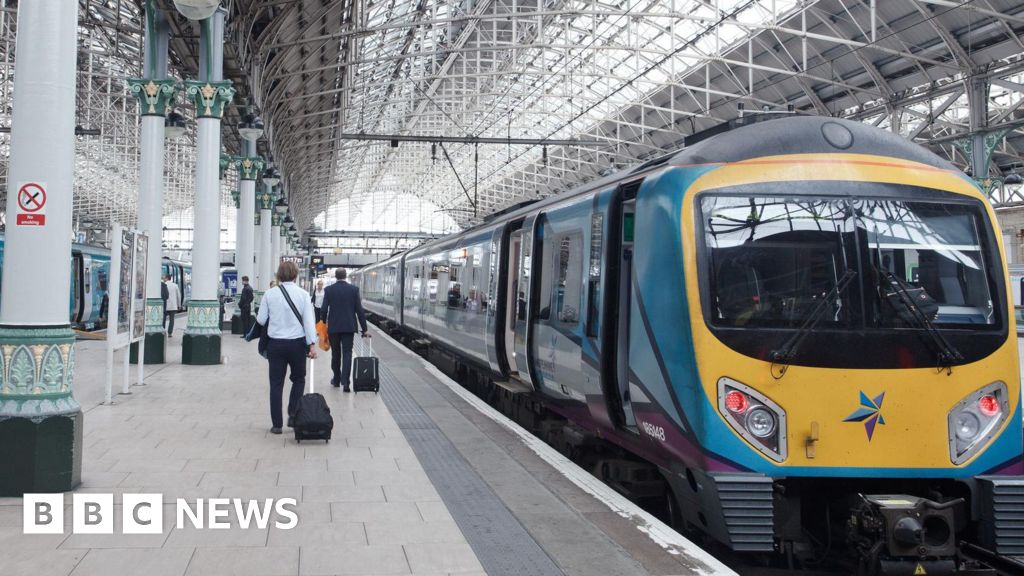Faisal IslamEconomics editor
 Getty Images
Getty ImagesPlans to extend high-speed rail across the north of England have been delayed further and will not now be announced by the prime minister at the Labour Party conference next week.
The BBC understands concerns over the long-term costs of the line earmarked between Liverpool and Manchester have pushed back the revival of Northern Powerhouse Rail.
An announcement had been expected on multiple occasions in recent months, but insiders said an extended review process of the project was under way in a bid to avoid mistakes made with HS2, which has been dogged by problems and costly delays.
Downing Street and the Treasury have been approached for comment.
The idea of Northern Powerhouse Rail was first put forward by former Conservative chancellor George Osborne in 2014.
A new rail line between Liverpool and Manchester was a central piece of the overall Northern Powerhouse rail project, which is aimed at cutting travel times between northern cities and towns and boosting the UK economy outside of London.
Parts of the scheme have been downgraded and changed by various governments but Chancellor Rachel Reeves said in June she would “set out” plans to “take forward our ambitions for Northern Powerhouse Rail….in the coming weeks”.
A plan had been expected at the time of the June Spending Review, then the government’s infrastructure strategy unveiling, and then in the publication of a pipeline of key infrastructure projects, but no announcements have been made to date.
Northern mayors were reassured by indications that plans for the new rail line alongside a “Northern corridor” regeneration plan would occur before or at the Labour Party conference.
Some insiders told the BBC it had been planned as a central announcement for the Liverpool conference in Sir Keir Starmer’s speech before an intervention in the past fortnight.
Lucy Powell and Angela Rayner, who had been the project’s biggest champions in the cabinet, are no longer ministers.
The Department of Transport is understood to have proposed a specific plan to the Treasury, in order to release preparatory and development funds worth up to £1.5bn to allow for building work to begin around 2030.
But it is understood more time is being taken to process an “extended tyre kicking” of the plans to ensure that the project has been fully scoped out before pushing ahead – a HS2 mistake the government wants to avoid.
HS2 has been beset by setbacks, leading to missed deadlines and ballooning costs, and will now only run from London to Birmingham, with previous plans to go further north scrapped.
In June, the government said the opening of HS2 would be delayed beyond the target date of 2033, but it did not say when the high speed line will begin operating.
Value for money?
A particular issue is whether the Treasury believes that connecting Manchester Airport to the centre of Manchester, a part of Northern Powerhouse Rail which overlapped with part of the cancelled HS2 Phase 2, represents value for money.
It had been a key part of the project’s benefits, allowing easy access to the airport from across the north of England.
Greater Manchester Mayor Andy Burnham has previously called on the government to push ahead with the Liverpool to Manchester rail line, and has jointly proposed a route with Steve Rotherham, which includes Manchester Airport.
In response to the plans being delayed again, a source close to Burnham told the BBC: “Any more tyre kicking and there will be no tyre left.”
In August, the boss of Manchester Airport Chris Woodroofe said poor transport links across northern England were holding back its economic potential. He said Northern Powerhouse Rail would be vital to boosting investment and exports for northern businesses.
When HS2 Phase 2 was cancelled by former prime minister Rishi Sunak two years ago, £12bn of its budget was saved for this part of Northern Powerhouse Rail.
But the architect of the cancellation of HS2 Phase 2, Andrew Gilligan, recently wrote a report for the centre right think tank Policy Exchange, calling for Northern Powerhouse Rail to be scrapped.
The report was backed by Reform, whose deputy leader Richard Tice warned companies “not to bother” bidding for contracts.
